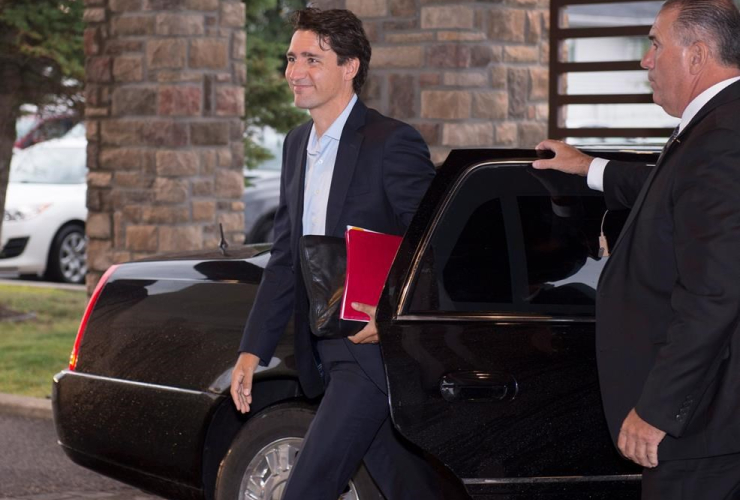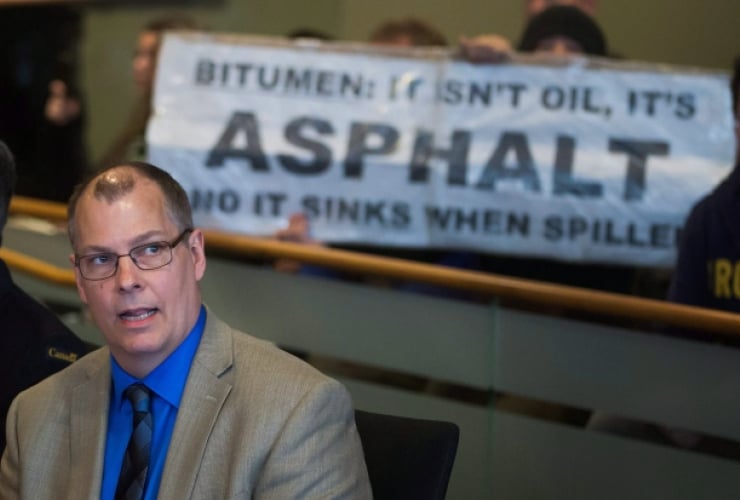There is no shortage of advice for Prime Minister Trudeau on what should become of the Energy East project review, including highly divergent suggestions from former prime minister Brian Mulroney and Québec Minister of Finance Carlos Leitao. As the saying goes, a solid approach on handling advice is to take what is useful and leave the rest behind. With so much at risk, from climate change impacts to drinking water disasters, we offer our views on what the prime minister should take, and what he should leave behind.
First, we have the useful advice offered by Québec Minister of Finance Carlos Leitao, as reported in the Wall Street Journal, September 14, 2016: “I think it it’s time to perhaps take a bit of a break and relaunch this in a way so we can follow due process and make sure we look at all the issues.” While it may take more than a bit of time to create a process in which the government acts as neutral “referee” rather than cheerleader, we agree that it’s time to step back on Energy East. Reflect. Revise. Relaunch.
The Minister’s view that it’s time to hit the reset button flows not only from a concern for “due process”, but also from concern for the well-being of a sizeable chunk of Canadian citizenry. As the Wall Street Journal reports, after noting that the proposed Energy East project “goes through sources of fresh water for three million people,” he added that such issues, “cannot be handled in a cavalier way.” This is helpful advice.
In sharp contrast, we have Former Prime Minister Brian Mulroney’ plea to Prime Minister Justin Trudeau to "take personal charge" of the Energy East project, as reported in a September 13, 2016 article in The Globe and Mail.
We are of the opinion that Prime Minister Trudeau won't, and really shouldn’t, do any such thing.
Why? If only because the Energy East project is hugely controversial in Quebec, where the Liberals have won 40 of the 78 seats during the last election (when was the last time that happened?). And because more than 300 municipalities have come out against it, as well as the two major unions (you did read this right: the two largest trade unions in Quebec are opposed to Energy East). And that the Union des producteurs agricoles (the provincial farmers union) also decided to oppose Energy East (the first energy project in the Union’s history to be rejected).
Then, there's the debacle of the National Energy Board, which was supposed to help restore "trust in our environmental assessment processes". Well, that plan came crashing down last week when, under pressure from First Nations, municipalities, citizens, environmental group and even the federal government, the panel tasked with evaluating the project had to recuse itself (and the Chair and Vice Chair of the NEB did the same).
When reading Mr. Mulroney’s comments in The Globe and Mail, one is forced to wonder which "markets" he is he talking about, exactly. Those same markets that have led to 50 000 jobs being lost in Alberta over the last two years? The Asian market that has access to faster and cheaper supplies in its own part of the globe, such as Saudi and Russian oil, letting it skip pricey retrofits that may be needed to process our heavy bitumen? Perhaps someone should have reminded him that Irving Oil eventually admitted that even if Energy East was build, they would continue importing Saudi oil because of its low cost.
The last, and perhaps most important reason why we think that Prime Minister Trudeau shouldn't "take personal charge" of Energy East is his own declaration from last January that his government wouldn't act as "cheerleaders" for pipeline projects.
Wise words indeed.
The previous government tried that approach, and what a mess they have created.
Mr. Mulroney, who signed the UN Framework Convention on Climate Change in Rio nearly 25 years ago, should understand the importance of having a process that reflects the science of climate change rather than industry desires or politics.
If the Prime Minister should take charge of something, it should be to ensure that the process for evaluating pipeline projects should be revised completely.
Robert Kenner's film, The
Robert Kenner's film, The Merchants of Doubt, has been available for four years now to show us exactly how other writers (Naomi Oreskes and Erik M. Conway) first revealed how "pundits for hire" have lied to the public since the days of "no scientific evidence that smoking is harmful." Reading this article today, leaves the same bad taste in the mouth about an oil industry in the hands of an amoral crowd and bent politicians, still at work on the west coast. The National Observer demonstrates how much distance there must be between commercial interests and the news industry today.








Comments